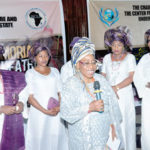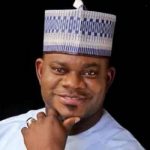Over three decades after he was pulled out of the Nigerian Army, the Alake of Egbaland, Oba Michael Adedotun Gbadebo, is a living testimony to the expression that old soldier never dies. Born on September 14, 1943 to Prince Adesanya Osolake Gbadebo and Madam Amoke Gbadebo, the Alake, whose grandfather, Oba Gbadebo (1898-1920) was the sixth traditional ruler of Egbaland, had an eventful childhood.
After the immediate past Alake, Oba Oyebade Lipede, joined his ancestors on February 3, 2005, Oba Gbadebo weathered the succession storm, polling 15 of 23 votes ahead of his younger brother and others. On November 19, 2005, he was crowned the 10th Alake of Egbaland.
In this interview, he takes TUNDE BUSARI on a tour of the last 14 years on the throne.
Abeokuta is commonly referred to as ‘gateway town’. What does that really mean?
Simply put, we were the major town in West Africa through which the missionaries entered what was to be later known as Nigeria.That is why we recorded firsts in different areas of human life. The first missionary, Henry Townsend, arrived here in 1843. The first newspaper was established in 1859. The newspaper, as you must have been taught in journalism class, was named ‘Iwe Irohin’. The first hospital was founded in 1895. The first church, The Cathedral of St. Peter at Ake, was also founded here.
Egbaland is famous for having produced former President Olusegun Obasanjo and Chief Ernest Shonekan who presided over an interim government between August 1993 and November 1993. How do you feel about this?
Of course, it is a rare occurrence but before I go further, let it be known that we produced three presidents. The late MKO Abiola was elected as the president of the Federal Republic of Nigeria on June 12, 1993 but he was denied that right to form his government. That chapter of our history as a nation, especially when he died in detention in 1998, was my bad moment. Despite the challenge Abiola was facing, I was still optimistic that he would become the president, especially after the death of General Sani Abacha. That he was denied his mandate should not deny him his rightful place in our political history. And I am very happy that the incumbent President Muhammadu Buhari recognised this truth and right the wrong last year by bestowing on him the highest national award of GCFR, which is reserved only for past presidents. Egba has been a destined place from the onset. What the status, as you asked, has imposed on us is responsibility to preserve the heritage and maintain that leading role. The standard is already there, and we should not compromise it. Those people have worked their ways to the top, and the best we can do is to sustain the standard and even improve upon it. That is how they would be happy and proud of the town.
Aside from the military, you also attended the same secondary school with Chief Olusegun Obasanjo. How would you describe him?
He was my boss in the army and also my senior in Baptist Boys High School. He was a brilliant student but I did not meet him per se in school because I was in form one when he passed his GCE at form five, and was leaving the school. But I met his classmates who had to complete form six. That’s how I was able to gather that he was a brilliant student, even though his disposition would not reveal that attribute. You can’t see it in him. Even in the military where he attained so much from being the commander of the Third Marine Commando who ended the Civil War, to being minister for works, to chief of staff, supreme headquarters, he always played his status down. He is blessed with wisdom, and he does not feel all criticism thrown at him. He acts and moves on.
[UPDATE] Inconclusive elections: Again, Bauchi, Plateau govs storm Aso Rock
Recently there was an exchange between you and him over President Muhammadu Buhari. What was it all about?
I only told him to stop criticising President Buhari. I told him the president is my boss and he also replied me that he is also president Buhari’s boss too. I felt I should let him know the implication of his criticism of the president. What you called an exchange has nothing to do with our respective personalities. It is about public issue, and we have moved on.
What do you observe are character traits that set the Egbas apart from other people?
Basically, there is no character trait you find in the Egbas which you won’t find in other Yoruba people. Yoruba people are blessed with good character trait which is built on promotion of dignity: ‘Omoluabi’. We are fair minded on issues. We are trained to respect elders and treat them well. The Bible says honour your father and your mother and the elderly ones. The level of civilisation among the Yoruba is a subject of envy to those who came to colonise us. Our family system ensures unity and cohesion such that an old man is always surrounded by members of his extended family apart from his children and grandchildren. He is not left alone. The British don’t have the same system, and they like ours.
I learnt that there is a strong connection between Egba and Ibadan. Can you expatiate on this?
There is no doubt that there is a strong connection between the two towns as you have said. There must be connection between us because what you know as Ibadan was part of Egba.
How do you mean?
There is no controversy over it that those places as Moniya, Ojoo, University of Ibadan, Oje, Idi Arere were Gbagura land. Up to Fiditi, they were Gbagura towns. For instance, in Fiditi, an Egba man is given discount in the market by Fiditi traders. Ibadan is a town which comprises warriors from different parts of Yorubaland. I mean those warriors from the 100 years civil war, migrated to form what is today Ibadan. That is a statement of fact which is well documented. As I said earlier, the Ibadans know this that the town is a convergence of different Yoruba towns. If you go through the list of the Olubadans, you would see their origins to understand better what I am talking about.
Can you also shed light on the connection between Abeokuta and Itori Egba?
As the name implies, Itori Egba is an extended settlement of Egbaland. The town was founded by the Egbas, who after 1830, settled in areas beyond Ogun River. Before then we were all at this side of the river. It is a thing of joy that Itori is growing and expanding. This is a credit and something we are all proud of as Egbas.
How can you describe the Olu of Itori Egba, Oba AbdulFatai Akorede Akamo?
Oba Akamo has always been a very interesting personality to whom I am pleased. Though he appears young, he is close to 60, an indication of his special attention to his health and his well-being. He is likeable, sociable and blessed with other different attributes which stand him out as a prominent son of Egbaland who is expanding the territory of Egbaland. He has brought the town to the limelight to become the headquarters of Ewekoro Local Government. He has followed the footsteps of his predecessor by creating obaship in other communities. The summary of it is that his 15 years on the throne has witnessed some development which speaks volume of his thirst for transformation. You cannot meet him without picking an interest in him. He is level-headed, humble and always ready to listen to words of the elders.
I once saw you quoting from both the Bible and Quran, something that surprised me. Can you explain this?
I was born a Muslim but got converted at age 13. In Gbadebo family till date, we are both Muslims and Christians. The religious harmony you see in us is what obtains in other Yoruba towns and communities. We celebrate Islamic festivals and Christian festivals together without any discrimination or ill-feelings. Recently, I was with President Muhammadu Buhari in the villa. During our discussion, he told me how impressive he is about the way the Yoruba Muslims and Christians relate under a peaceful atmosphere. He said the Yorubas are a good example of how a nation should handle religious matters. I was happy and very proud of my race while listening to the president pouring praises on the Yoruba concerning religious tolerance among us.
Another Lisabi Festival is knocking on the door. What does the festival symbolise?
Lisabi Festival is celebration of selfless service; it is the celebration of nationalism, heroism and of nationhood. All these attributes are combined by Lisabi who fought and secured our freedom. Lisabi was our liberator from Oyo. He was the founder of the modern Egba.
The theme for this year’s festival is girl-child education. What informed that choice?
The choice came from our critical observation that we have not got enough number of girls in schools. We are not satisfied with the number we have currently, hence the need to rise up and sensitise parents on the need to take their girls to schools. We are in an age of opportunities for both male and female. We have reasons to promote education of girls with the exploits which females achieve around the world. Your sex is no more as important as your qualification as well as your competence.







